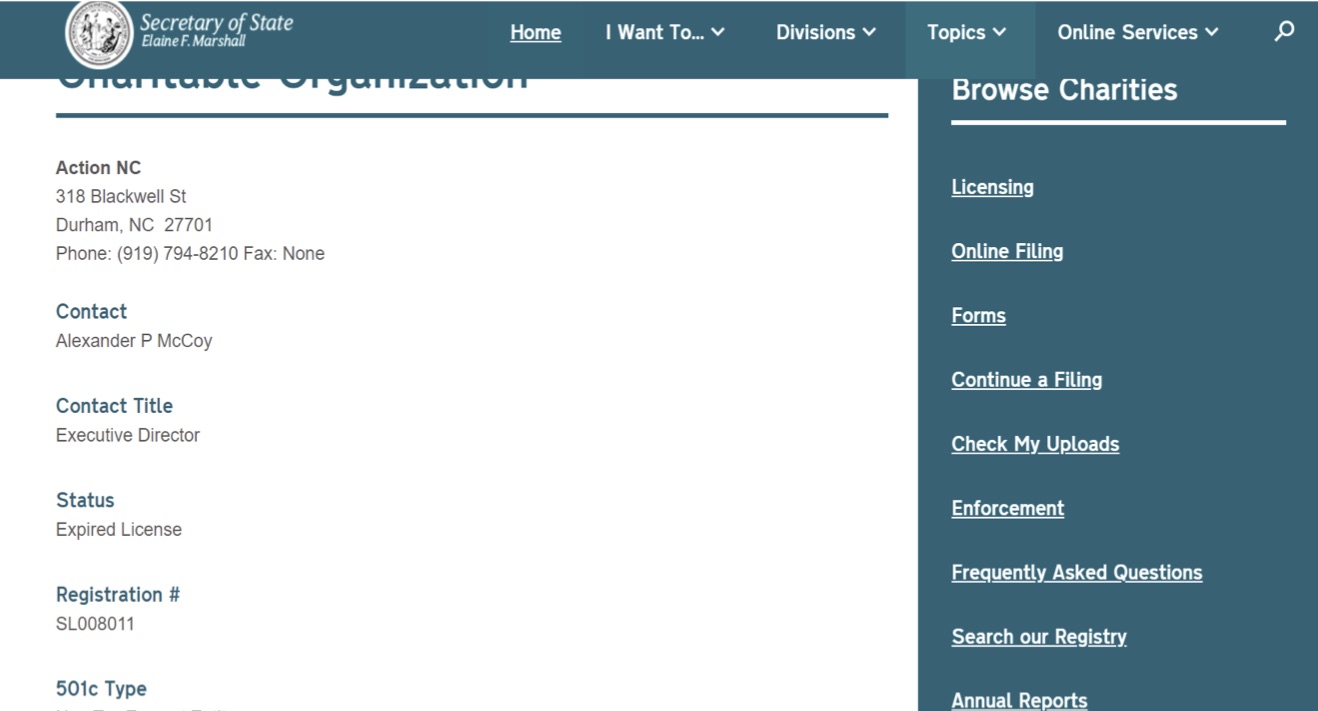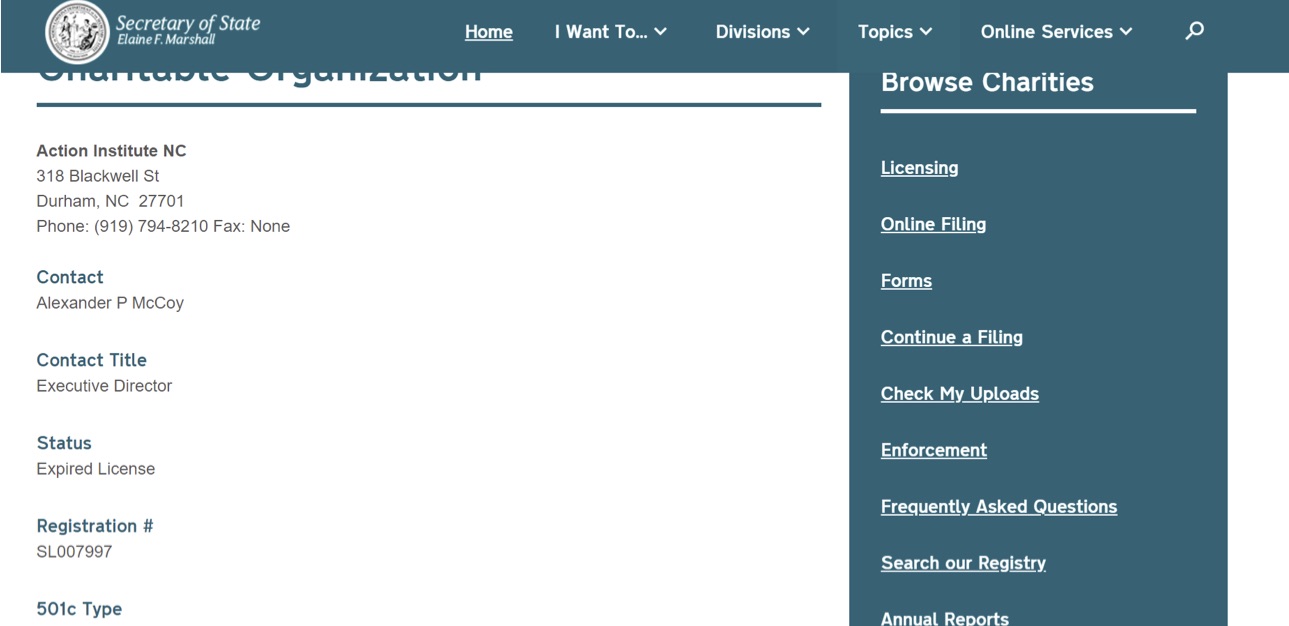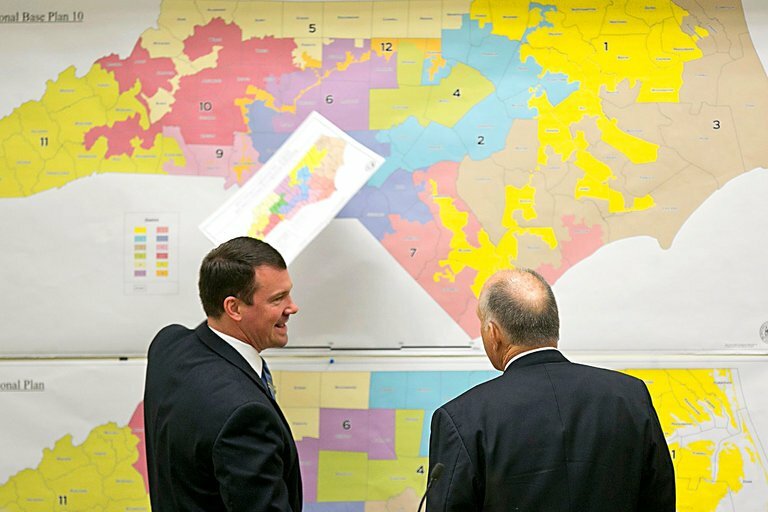- North Carolina has strict laws dictating how charities and nonprofits can solicit funds
- In order for a charity or nonprofit to raise money in North Carolina, it must file and have an active license with the Secretary of State’s office
- Action NC’s license expired back in August 2018
During an August 10 joint legislative redistricting committee hearing, we heard from many individuals and groups regarding the new legislative redistricting process. Those who have followed North Carolina’s redistricting cases would likely recognize names like Bob Phillips of Common Cause North Carolina, Jennifer Rubin with the League of Women Voters, or Aylett Colston from EveryVoiceNC. They all represent progressive organizations that have been frequent critics of Republican redistricting efforts and have been active in the various lawsuits against the state’s election policies, such as implementing voter ID and redistricting.
Most of the speakers from the public represented or were associated with progressive organizations, whether it be former U.S. Attorney General Eric Holder’s group, All On The Line, the Southern Coalition for Social Justice, or one of the other progressive organizations that have been a part of prior redistricting challenges.
One of the voices we heard was Action NC’s Flora Jean Busby, who is listed as a community organizer for the Charlotte region on their main page and whose job is to supervise and train volunteers and temporary employees. She echoed many other progressive advocates regarding the implications of partisanship in the redistricting process.
That caught our attention because Action NC recently has been in the news regarding its involvement in a controversial operation in Mecklenburg County. They have partnered with the county government there to assist in promoting Covid-19 vaccines door to door. Since March, they have knocked on over 30,000 doors and coordinated with Mecklenburg officials to hand out shots and $25 gift cards to all those who get the vaccine. Congressman Ted Budd (R) has questioned this partnership — and its utilization of taxpayer dollars — with an organization that has been heavily involved in ideological and partisan grassroots efforts.
Action NC Disregarding North Carolina Licensure Laws
After further review of the organization, there are even more questions. Action NC is not in compliance with state law. Neither Action NC nor its 501(c)(3) grassroots arm, Action Institute NC, are currently licensed to raise funds in North Carolina as required by state law for nonprofits. Records from the North Carolina Secretary of State’s Charities & Fundraisers search engine show both organizations have been out of compliance since August 15, 2018, having failed to renew their solicitation licenses since then (see below).

Screen shot of the Secretary of State’s entry for Action NC, August 13, 2021

Screen shot of the Secretary of State’s entry for Action Institute NC, August 13, 2021
Under North Carolina General Statutes § 131F-5, a charitable organization must have a license to solicit contributions in the state. Action NC has continued to be active both in its fundraising and get-out-the-vote activities for the last three years, while failing to meet North Carolina’s basic legal requirements for charity organizations. Violations under this chapter in North Carolina law can fall under unfair trade practices as outlined in G.S. § 131F-21.
While we don’t know much money Action NC has raised since falling out of compliance, we have some limited records that are publicly available to go by. While not reporting to the Secretary of State’s office, Action Institute NC did submit a report in 2019 to the IRS. The report indicates that it received $743,935 in grants while operating out of compliance with state law. Additionally, the Z. Smith Reynolds Foundation’s 2020 approved grant report shows that it provided Action Institute NC $30,000 under its “Strengthening Democracy” grant program late last year.
Background on Action NC
While often referred to as Action NC for both versions of their nonprofit, Action Institute NC is listed as the controlling organization for both nonprofits and appears to share staff and an executive director, Pat McCoy.
The organization originally stemmed from the Association of Community Organizations for Reform Now (ACORN), which dissolved in 2010 due to voter fraud scandals (registering felons and payment per voter registration in states where it is illegal to do so). Action NC is run by ACORN NC’s former head, Pat McCoy, and appears to be a continuation of that program. Action NC has been tied with other networks such as Blueprint NC, the organization famous for its 2013 memo detailing how the coalition will work to “eviscerate, mitigate, litigate, cogitate and agitate” the state’s leadership. The organization was a key partner in the Moral Monday Rallies led by then–NC NAACP chair Rev. William Barber II and helped manage and organize the protests held at the General Assembly against the new Republican leadership.
Action NC advocates for progressive causes and does get-out-the-vote efforts for immigration reform and road to citizenship for illegal immigrants, dismantling of immigration enforcement practices like local law enforcement cooperating with U.S. Immigration and Customs Enforcement (ICE), expansion of abortion access, and Medicaid for all. It has sued, alongside the Southern Coalition for Social Justice, over alleged violations of the Motor Voter Act and for felony voting.
Action NC is the 501(c)(4) legislative action group of Action Institute NC, its grassroots arm, and has been backed by major leftwing organizations such as the Z. Smith Reynolds Foundation. Action NC frequently works on progressive get-out-the-vote efforts via canvassing and phone bank operations during the election season.
Given that Action NC has continued to be active in North Carolina elections and even partnering with North Carolina’s second largest county government, one would think they would at minimum stay in compliance with state law. The Secretary of State’s office has a large amount of leeway in how they decide to handle situations of noncompliance, ranging from a monthly $25 late fee, probation, to closure of their committee should they continue their failure in comply with North Carolina law. We shall see how the Secretary of State’s office decides to proceed with the issue of this left-leaning activist organization.


